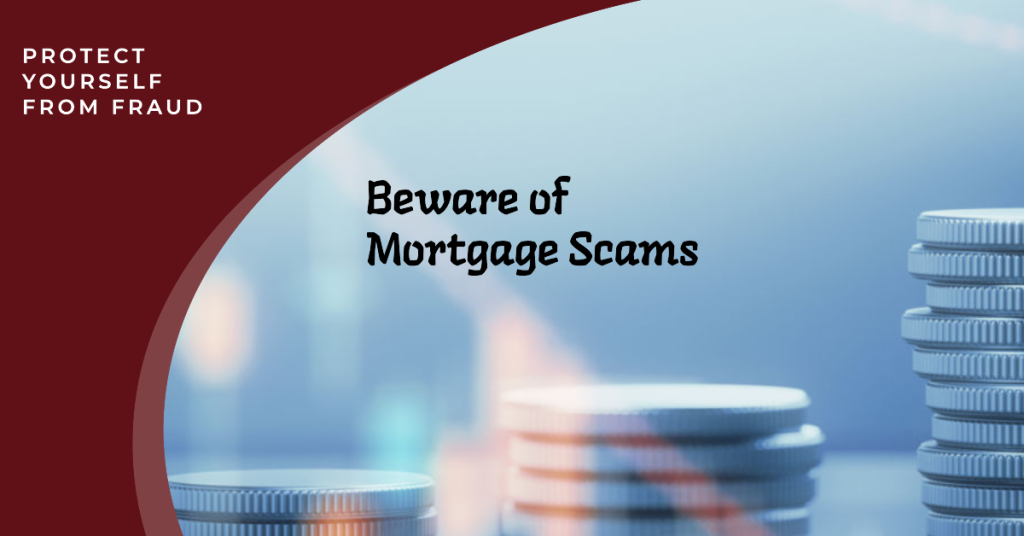Are you looking for a home or refinancing your existing property? Want to avoid Mortgage Scams. The world of mortgages can be complex, filled with various terms, insurance requirements, and potential scams
In this article, we will guide you through the Expert Tips, helping you understand the importance of insurance, the role of mortgage servicing, and how to avoid mortgage scams. So, let’s dive in and unravel the mysteries surrounding mortgages!
What is a Mortgage?

A mortgage is a loan provided by a financial institution, typically a bank, to help individuals purchase or refinance a property. It is a legal agreement between the borrower (the individual seeking the loan) and the lender (the financial institution). The borrower agrees to make regular payments over a specified period, usually years until the loan is fully repaid. Mortgages are secured by the property, serving as collateral for the loan.
When it comes to mortgages, there are various types available to suit different financial situations and goals. To learn about it Click on this Basic Types of Mortgage
Importance of Insurance in Mortgages

Insurance plays a crucial role in mortgages, protecting both the borrower and the lender. It mitigates financial risks associated with homeownership and helps ensure the smooth functioning of the mortgage process. Let’s delve into the different types of insurance relevant to mortgages.
Private Mortgage Insurance (PMI)
Private Mortgage Insurance (PMI) is typically required when the borrower makes a down payment of less than 20% of the home’s purchase price. PMI premiums are usually added to the borrower’s monthly mortgage payment until the equity in the home reaches a certain level.
Mortgage Life Insurance
Mortgage Life Insurance is designed to pay off the remaining mortgage balance in the event of the borrower’s death. It provides financial security to the borrower’s family, ensuring they won’t inherit the burden of mortgage payments. Mortgage Life Insurance can offer peace of mind, but it’s important to evaluate the terms and costs associated with it carefully.
Homeowner's Insurance
Homeowner’s Insurance is a type of insurance that protects the borrower and the lender from potential damages or losses to the property. It covers risks like fire, theft, vandalism, and natural disasters.
Lenders often require borrowers to have homeowner’s insurance as a condition of the mortgage. Understanding the coverage limits, deductibles, and specific policy terms is essential to ensure adequate protection.
What is Mortgage Servicing?

Mortgage servicing refers to the administrative tasks involved in managing a mortgage loan after it originated. When a borrower obtains a mortgage, the servicing of that loan may be transferred or sold to a different company. The mortgage servicer is responsible for collecting payments, managing escrow accounts (if applicable), maintaining records, and handling other aspects related to the loan.
Role of Mortgage Servicers
Mortgage servicers act as intermediaries between the borrower and the lender. Their responsibilities include sending monthly statements, processing payments, managing escrow funds for property taxes and insurance, addressing borrower inquiries, and facilitating loan modifications or refinancing requests. They play a vital role in ensuring the smooth operation of the mortgage and maintaining communication between all parties involved.
Common Issues with Mortgage Servicing
While mortgage servicers play an important role, there can be challenges and issues that borrowers may encounter. Some common problems include errors in account handling, misapplication of payments, delays in processing requests, and lack of responsiveness. Borrowers must stay proactive, maintain accurate records, and promptly address any concerns with their mortgage servicer to avoid potential complications.
Types of Mortgage Scams

Unfortunately, the mortgage business experiences its fair share of fraud and scams, so borrowers must be vigilant to protect themselves. It is critical to be informed about typical frauds in the mortgage industry. Here are a few instances of mortgage fraud:
- Scammers target: struggling homeowners about to go into foreclosure as their main target for foreclosure rescue scams. They promote false optimism and make exaggerated promises that they will save their homes. When working with such people or businesses, homeowners should exercise caution.
- Loan Modification Scams: Fraudsters may deceive borrowers by claiming to provide loan modification services. They often demand upfront fees but ultimately fail to fulfill their promises. Unfortunately, this leaves borrowers in a worse financial situation than before. Borrowers need to exercise caution and thoroughly research any service provider before engaging their services.
- Identity Theft: Criminals involved in mortgage scams may resort to identity theft to carry out fraudulent activities. By stealing personal and financial information, these individuals can fraudulently obtain mortgages or commit other financial crimes using the victim’s identity. Borrowers should take proactive steps to safeguard their personal information and be alert to any signs of identity theft.
To protect themselves and make wise decisions, borrowers must constantly be on the lookout for these kinds of mortgage frauds. People can protect their financial security and prevent falling for fraudulent schemes by being informed about prospective frauds.
Signs of a Mortgage Scam
Being vigilant and recognizing warning signs can help borrowers avoid falling victim to mortgage scams. Some red flags include:
- Unsolicited offers or communications with unrealistic promises
- High-pressure tactics to sign documents quickly without proper review
- Requests for upfront fees before providing any services
- Lack of proper licensing or credentials from the individuals or companies involved
- Poor reviews or complaints about the individuals or companies online
Tips for Avoiding Mortgage Scams and Ensuring Financial Security
In today’s complex mortgage landscape, it is crucial to exercise caution and thoroughness to safeguard oneself from potential scams. By following these guidelines, individuals can minimize the risk of falling victim to fraudulent schemes while maintaining professionalism and relevance:
- Choose Established and Reputable Lenders and Mortgage Professionals:
To ensure a secure and trustworthy mortgage process, working with lenders and mortgage professionals with a solid track record is essential. Look for well-established institutions or individuals with a proven history of providing reliable mortgage services.
Verify Credentials and Background:
Thoroughly researching and verifying the credentials of individuals or companies involved in the mortgage process is crucial. Confirming their licensing, certifications, and affiliations with reputable industry organizations can help determine their credibility and legitimacy.
- Exercise Caution with Unsolicited Offers and Upfront Fees: Be wary of unsolicited offers that arrive via email, phone calls, or other means. Scammers often use these tactics to entice unsuspecting individuals into fraudulent mortgage schemes. Additionally, avoid paying upfront fees before thoroughly understanding the terms and conditions. Legitimate mortgage professionals typically disclose all associated costs upfront, and any requests for upfront payments should be scrutinized.
- Review and Understand All Documents: It is essential to carefully read and comprehend all documents before signing anything related to a mortgage. Seek legal advice to understand the terms, conditions, and potential risks comprehensively. Pay particular attention to interest rates, repayment terms, and any potential penalties or hidden fees.
- Maintain Vigilance by Monitoring Credit Reports and Financial Accounts:Regularly monitoring credit reports and financial accounts is a proactive step toward identifying any suspicious activity or signs of unauthorized access. Utilize reputable credit monitoring services to receive alerts for any unusual transactions or changes in credit status promptly.
By incorporating these additional insights into the initial content, we have provided an extended and more comprehensive guide to help individuals avoid mortgage scams and protect their financial well-being.
Conclusion
Navigating the complex world of mortgages can be daunting, but with the right knowledge and awareness, you can make informed decisions and protect yourself from potential risks. Understanding the importance of insurance, the role of mortgage servicing, and the warning signs of scams is crucial for a smooth and secure mortgage experience. Remember to stay proactive, ask questions, and seek professional advice.
FAQs
If you fail to pay your mortgage insurance premiums, it can result in consequences such as a potential default on your loan, foreclosure proceedings, and damage to your credit score. It is important to fulfill your financial obligations to maintain mortgage insurance’s protection and benefits
Yes, in certain cases, you can request the cancellation of private mortgage insurance. Typically, once your home’s equity reaches 20% or more, you may be eligible to cancel PMI. However, specific requirements and procedures vary, so it’s important to check with your lender to determine the criteria for cancellation.
If you suspect an error in the servicing of your mortgage, it is important to act promptly. Begin by contacting your mortgage servicer and expressing your concerns. Keep detailed records of all communication and documentation related to the issue. If the issue remains unresolved, you may seek legal advice or file a complaint with the appropriate regulatory agency.









